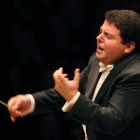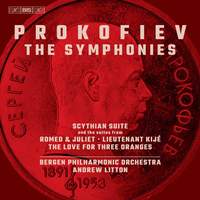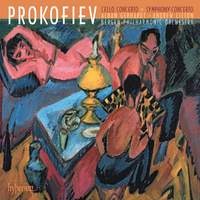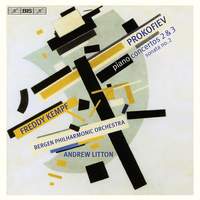Interview,
Andrew Litton on Prokofiev
 Released on BIS between 2013 and 2020, Andrew Litton's recordings of the Prokofiev symphonies with the Bergen Philharmonic Orchestra have been praised by BBC Music Magazine for the American conductor's 'fine championship of the composer' and 'unstinting work on detail', and described in Gramophone as ' one of the most sonically sophisticated [Prokofiev cycles] in the lists'.
Released on BIS between 2013 and 2020, Andrew Litton's recordings of the Prokofiev symphonies with the Bergen Philharmonic Orchestra have been praised by BBC Music Magazine for the American conductor's 'fine championship of the composer' and 'unstinting work on detail', and described in Gramophone as ' one of the most sonically sophisticated [Prokofiev cycles] in the lists'.
Ahead of the release of the complete box-set tomorrow, I spoke to him about the special qualities which the orchestra bring to this music, how his mentor Mstislav Rostropovich and his own work with New York City Ballet influenced his perspective on the composer, why some of the symphonies are still so rarely programmed and performed, and the joys of having a 'lockdown baby'...
Whereabouts are you at the moment, and is your schedule getting back to normal?
I’m in New York getting ready for the opening of the New York City Ballet season, and after eighteen months everyone’s so eager to be back. A lot’s changed since we last played together, of course: so many people in the ballet company have had babies, including me! It’s been twenty-one years since my last baby, and as I’ve only done four weeks of conducting since March 2020 I’ve loved being around to watch her grown up. As usual I’m going back with a vengeance, because right after conducting opening night here I’m straight on a flight to London where I’m recording the Liszt piano concertos with Alexander Ullman and the BBC Symphony Orchestra.
We have three more weeks of Fall season here after that, then I’m back to Europe for my usual gigs: I see the old gang in Bournemouth once a year, and this season I’m going to Wrocław for the first time. They have a Chopin piano competition, so the first part of the programme will be either the First or Second Piano Concerto, depending on who wins…That’s a tough gig either way, because they’re both great to listen to and to play but fairly excruciating to conduct!
So the Prokofiev cycle must feel like it happened an age ago…
It does, but it was such an exciting project and we lived with it for a long time: it spanned about ten years, I think, of my relationship of a little over twelve years with the orchestra. It all started with Romeo & Juliet, and the idea of doing the symphonies came about after that had been released. Scheduling these recordings took a long time, because Bergen just gets so busy: there are several different record-labels who like the orchestra a lot, and there are also subscription-programmes which can’t be moved around. The last instalment of Symphonies Nos. 1-3 was actually made when I was Music Director Laureate.
The first time I guest-conducted Bergen was in Shostakovich’s Fifth Symphony, and they just had that first-half-of-the-twentieth-century Soviet sound down pat. It’s so funny to say that, because although there are twenty-odd nationalities in the orchestra I don’t think any of the players are actually Russian! I think the reason is that they’d had Music Directors like Dmitri Kitayenko who’d done a lot of this repertoire, and one of the characteristics of this orchestra which I fell in love with immediately was the wild abandon with which they play: they don’t hold anything back, even in rehearsal, which is exactly what this music needs.
And who inspired you personally in this repertoire?
I was lucky enough to be Rostropovich’s assistant conductor in Washington for four years, right after I graduated from Juilliard, and he simply owned Shostakovich and Prokofiev! He and Shostakovich were firm friends, but with Prokofiev it was more of a student-teacher relationship; he had input into the Sinfonia Concertante (exactly how much depends on which cellist you talk to), and it was Rostropovich who convinced Prokofiev to write a loud ending for the Seventh Symphony so that he would win the Stalin Prize, which was something like 300 000 roubles. Prokofiev was in dire straits because of the health problems he suffered after having a bad fall, and there was simply no cash in the kitty, so he told Rostropovich ‘I’ll write the loud ending, but I’m also going to write the ending that I want – you’re going to outlive me, so please make sure that people only do the soft ending’. I thought it would be interesting to record the last movement both ways so people can actually see what he was thinking: the loud ending feels quite abrupt and tacked-on, then you have the deep and meaningful one which is so much more moving.
One of the amazing by-products of being assistant to Rostropovich was that he actually taught me: I had lessons with him on Shostakovich and Prokofiev, and he would tell me these fantastic stories about them. One of his favourites was describing how Prokofiev (who was an amazing pianist, let’s not forget) loved to play ‘The Death of Tybalt’ on the piano - when he got to those fifteen chords he would splay out those long, thin fingers and smash down on the keyboard with a smile of absolute joy on his face! It’s an amazing image, and pops into my head every time that I conduct it.
That take-no-prisoners approach to music-making is what I learned from Rostropovich, because that is absolutely the way that he conducted this repertoire: the only subtlety was that there was no subtlety, and I mean that in the most positive way. There were some unforgettable performances, especially of Russian music, during his time there: the orchestra loved being coaxed into this kind of frenzy, and the audience adored it!
Were any of the symphonies new to you when you embarked on the Bergen cycle?
The most exciting thing was getting to know Nos. 2 & 3, because (like Shostakovich 2 and 3) they’re just never done. We had such fun, because they don’t just come out of the box like a perfectly formed thing: even though I believe they’re great pieces, you do have to work on them to make them speak. No. 2, especially the first movement, is so loud and relentless that when we started rehearsing it in Bergen I said ‘I don’t care what your part says: nothing louder than mf today!’. By the third day of rehearsals (which was pretty much right before the concert) I said ‘OK, now whenever you’ve got a fortissimo pop out and then recede’. It was almost a case of having to redo the dynamics to make the piece work for us, not just health-and-safety-wise but also musically: I think one critic (and if you’re reading this, thank you!) mentioned that they heard bits of melody that they’d never heard before. I really aimed for a pointillistic approach because no matter how thorny or bombastic he got, Prokofiev always had beautiful melodies in the midst of it all.
I fell in love with No. 4 when I was asked to do it for the very first time at a Prom honouring Serge Koussevitsky in 2011. The programme included Bax’s Symphony No. 2 as well as Prokofiev’s Fourth Symphony in the revised version - that was actually a bit of a cheat, because it was the original version that Koussevitsky performed. But I just love the revision: it’s like after the Fifth and Sixth symphonies Prokofiev went ‘You know what? I could make the Fourth into one of these!’. I love the melodic invention and the quotations from The Prodigal Son, which I’ve gotten to conduct in my relatively new job at New York City Ballet. It was a bit cart-before-the horse, because I’d conducted the symphony a lot already, but because ballets are repeated many times in a season I’ve notched up quite a few Prodigal Sons pretty quickly!
How much has your work at NYCB fed into your orchestral conducting?
One thing I hadn’t realised until I started at New York City Ballet was that George Balanchine, the founding father of the company, knew all of these people: he was best friends with Stravinsky, and worked with Prokofiev on The Prodigal Son. Apparently Prokofiev hated what Balanchine did to some of his tempi, particularly the third movement of the symphony: in the revised version it’s a gavotte in a nice, easy tempo, but in The Prodigal Son it becomes the Siren’s Dance and it’s over twice as slow! It works musically, but it’s not what the composer wrote, and they had a real falling-out over it: apparently Balanchine said he never even got his royalties! I think they probably patched things up eventually, because otherwise it wouldn’t be in our active repertoire.
Staying with the ballet connection, I’m fascinated by that period where Prokofiev was trying so hard to be like Stravinsky, especially Stravinsky in the Diaghilev era. Two years after the huge ultimate success of The Rite of Spring in 1913, Prokofiev submitted Ala and Lolli to Diaghilev, who was hoping for something like the Second Piano Concerto…instead he got this very dissonant Stravinsky-wannabe music! When you conduct the Scythian Suite you can see Prokofiev straining to outdo Stravinsky and failing so hard, but it’s still wonderful music if you judge it on its own merits.
Similarly, there are some cynics who say that the Fifth (which is Prokofiev's most popular symphony) is an attempt to out-Shostakovich Shostakovich. But I don’t necessarily see it that way: to me there isn’t a single moment in any Prokofiev that sounds like Shostakovich, but the cumulative energy and dramatic results are the same. They’re both grabbing for the throat, and once they get a hold they don’t let you go.
Edward Gardner mentioned that the acoustic in Bergen proved quite tricky for Schoenberg – how is it for Prokofiev?
I can see it presenting certain challenges for Schoenberg because there are so many tiny details that need to be heard, but it was great for Prokofiev because there’s so much height to the ceiling from the stage. It’s also got enough clarity for all those gorgeous little woodwind solos that Prokofiev writes to speak beautifully, and the percussion can go for it without you needing to show them the hand! The Bergen stage is also very large, so the musicians naturally want to spread out. One time very early in my tenure I had the stage manager draw the outline of the Musikverein stage on our stage and I said to the players: ‘OK, today we’re going to sit in this confine’. Everybody was grumbling about losing their real estate, but I said ‘This is reality, folks – and remember, the Vienna Philharmonic manages to fit on this platform!’.
Obviously the pandemic has put an end to that sort of proximity among the players for now, but as a conductor it was so great to approach even large scores as chamber-music: there was an intimacy to the music-making which sadly is gone for the foreseeable future. I’m glad we were able to record the Prokofiev cycle with normal seating: for the Liszt recording in London we’ll have to have the players a certain distance apart, and whilst half a metre doesn’t make that much difference in the string-section it does mean that the winds are miles away. It’ll be challenging, but it’s what we all have to do now.
Are there any Prokofiev works which are still on your wish-list?
I’ve never done Alexander Nevsky, and would love to have a go at that. I’ve even done the Ivan the Terrible music with the film three times, which was great fun! Somebody got hold of the original film, which was far better than video- or TV-quality, and it was an amazing experience! There’s this fantastic moment where the film suddenly goes into colour just like in The Wizard of Oz, because the Soviets had raided the AGFA film factory, discovered that the Germans had colour film and brought it back for [director] Sergei Eisenstein, who was overjoyed! The whole movie is ridiculously long, so we do scenes rather than the entire thing: 65 minutes of broad brushstrokes is enough to get the idea! Technology-wise, there’s just a very rudimentary clock that you follow – nothing like the sophisticated set-up you have for modern film soundtracks, but I always enjoy it so much.
Otherwise I just love doing the symphonies, and I offer them all the time. But when you’re guest-conducting you’re lucky if you can get orchestras to contemplate taking Nos. 4 and 6, let alone the less popular ones. They’ll programme No. 5, no problem, but I say ‘You just did that two years ago - let’s try something you haven’t done!’. If you can convince an orchestra to do anything beyond No. 5 the players love it, because so often it’s new to them.
Prokofiev: The Symphonies
plus Scythian Suite and suites from Lieutenant Kijé, The Love for Three Oranges, and Romeo and Juliet
Bergen Philharmonic Orchestra, Andrew Litton
Available Formats: 5 SACDs, MP3, FLAC
Alban Gerhardt (cello), Bergen Philharmonic Orchestra, Andrew Litton
Available Formats: CD, MP3, FLAC
Freddy Kempf (piano), Bergen Philharmonic Orchestra, Andrew Litton
Available Formats: SACD, MP3, FLAC, Hi-Res FLAC





